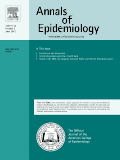
ANNALS OF EPIDEMIOLOGY
Scope & Guideline
Exploring Epidemiology's Impact on Society
Introduction
Aims and Scopes
- Health Disparities and Equity:
The journal focuses significantly on health disparities across different populations, exploring factors such as race, ethnicity, socio-economic status, and geographic location that influence health outcomes. - Chronic Disease Epidemiology:
A core area of research involves examining the epidemiology of chronic diseases, including cardiovascular diseases, diabetes, and cancer, analyzing their risk factors and long-term outcomes. - Infectious Disease Surveillance:
Research published in the journal often addresses infectious diseases, particularly the epidemiology of outbreaks, vaccination strategies, and the impact of public health interventions, such as during the COVID-19 pandemic. - Methodological Innovations:
The journal promotes methodological advancements in epidemiology, including the development of new statistical models, data analysis techniques, and approaches to handle bias in epidemiological studies. - Social Determinants of Health:
A significant emphasis is placed on understanding how social determinants, such as neighborhood characteristics, socioeconomic status, and educational attainment, impact health outcomes and disparities.
Trending and Emerging
- Impact of COVID-19:
A significant trend involves research related to the COVID-19 pandemic, including studies on vaccination efficacy, long COVID, and the socio-economic impacts of the pandemic, highlighting the importance of infectious disease epidemiology. - Health Equity and Social Justice:
Emerging themes increasingly address health equity, focusing on social justice in health, the impact of systemic racism on health outcomes, and the importance of inclusive research methodologies. - Mental Health and Well-being:
Research on mental health, particularly in relation to social determinants and the impacts of social isolation, is gaining prominence, reflecting growing awareness of mental health's significance in public health. - Use of Big Data and Advanced Analytics:
There is a trend towards utilizing big data and advanced analytics in epidemiological research, including machine learning and artificial intelligence, to derive insights from complex datasets. - Environmental and Climate Health:
Emerging studies increasingly focus on the intersection of environmental factors and health, particularly the impact of climate change on public health outcomes, signaling a shift towards addressing broader ecological determinants of health.
Declining or Waning
- Traditional Lifestyle Diseases:
Research focusing on traditional lifestyle diseases, such as obesity and its direct lifestyle correlations, appears to be waning as newer, more complex interactions between lifestyle, environment, and health are explored. - Single-disease Focus Studies:
There has been a noticeable decrease in studies that focus solely on single diseases without considering multi-morbidity or the interactions between various health conditions and social factors. - Basic Epidemiological Descriptive Studies:
There is a decline in purely descriptive epidemiological studies that do not incorporate advanced analytical methods or focus on intervention strategies, reflecting a shift towards more impactful research designs.
Similar Journals

EUROPEAN JOURNAL OF EPIDEMIOLOGY
Innovating research to shape the future of epidemiology.The European Journal of Epidemiology is a premier peer-reviewed journal published by Springer, specializing in the vast and critical field of epidemiology. With its ISSN 0393-2990 and E-ISSN 1573-7284, this journal has been a leading platform for disseminating high-quality research since its inception in 1985, encompassing a comprehensive range of topics pertinent to public health and epidemiological science. Proudly based in the Netherlands, the journal has secured a prestigious Q1 ranking in the field of Epidemiology and boasts an impressive Scopus rank of #8 out of 148 in its category, placing it in the 94th percentile among its peers. With a commitment to advancing knowledge and practice in epidemiology, the journal provides invaluable insights for researchers, healthcare professionals, and students, facilitating a better understanding of disease distribution and determinants in populations. While it operates under a subscription model, the European Journal of Epidemiology continues to uphold its reputation as an essential resource for innovative research and public health advancements through the years.

Kesmas-National Public Health Journal
Fostering Health Improvements Through Open Access ResearchKesmas-National Public Health Journal is a vital platform for the dissemination of research in the field of public health, published by UNIV INDONESIA. With its ISSN of 1907-7505 and E-ISSN of 2460-0601, this Open Access journal has been committed to promoting accessible health knowledge since 2006. Based in Indonesia, the journal addresses critical areas of public health, including epidemiology, health policy, and environmental health, with the aim to foster health improvements in diverse communities. Despite its classification in the Q4 category across several important fields as of 2023, including Epidemiology and Public Health, the journal remains a unique resource for local and international researchers seeking to contribute to pressing public health issues. With its Scopus rankings reflecting persistent challenges within the discipline, Kesmas invites researchers, professionals, and students to engage with its content to drive impactful discussions and advancements in health policy and practice.
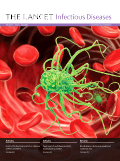
LANCET INFECTIOUS DISEASES
Connecting Researchers to Combat Global Health ThreatsLANCET INFECTIOUS DISEASES is a premier journal published by Elsevier Science Ltd, dedicated to disseminating high-quality research and comprehensive reviews in the field of infectious diseases. Since its inception in 2001, the journal has become a pivotal resource in the medical community, recognized for its rigorous peer-review process and impactful contributions to public health. With an impressive Scopus rank of #2 out of 344 in the category of Medicine - Infectious Diseases, it consistently ranks in the 99th percentile, highlighting its importance and influence in shaping clinical and epidemiological research. The journal's commitment to advancing knowledge in infectious diseases is underscored by its Q1 quartile designation in 2023, affirming its status as a leading academic outlet. Although not an open-access journal, LANCET INFECTIOUS DISEASES provides essential insights for researchers, healthcare professionals, and students, bridging the gap between cutting-edge research and practical application in an increasingly interconnected world.
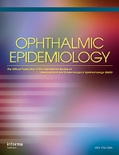
OPHTHALMIC EPIDEMIOLOGY
Bridging Knowledge and Practice in OphthalmologyOphthalmic Epidemiology, published by Taylor & Francis Inc, stands as a crucial platform in the fields of ophthalmology and epidemiology, with the journal's pivotal contributions recognized in its esteemed category quartiles, ranking Q1 in Ophthalmology and Q2 in Epidemiology for 2023. Since its inception in 1994, the journal has provided a multidisciplinary approach to understanding the distribution and determinants of ocular diseases, thereby informing public health practices and clinical interventions. With a commitment to disseminating high-impact research, it holds a Scopus rank of #45/137 in Ophthalmology and engages a global audience of researchers, practitioners, and students dedicated to advancing the field. Although it is not an open-access journal, Ophthalmic Epidemiology remains a vital resource for innovative studies and reviews that help shape evidence-based strategies to combat vision-related public health issues.

Epidemiology and Health
Shaping the future of public health through rigorous research.Welcome to Epidemiology and Health, a premier open-access journal dedicated to advancing knowledge in the fields of epidemiology and public health. Published by the Korean Society of Epidemiology since 1979, this journal serves as a vital platform for researchers, professionals, and students alike, promoting innovative research and robust discussion surrounding public health issues. Based in South Korea, it boasts a commendable Q2 ranking in the categories of Epidemiology, Public Health, and Environmental and Occupational Health, reflecting its significant contribution to the scientific community. With its current impact factor ranking it favorably among peers—#124 out of 665 in Public Health and #40 out of 148 in Epidemiology—Epidemiology and Health continues to uphold its mission of disseminating high-quality, peer-reviewed research. The journal's commitment to open access ensures that vital epidemiological insights reach a broad audience, supporting the collective goal of improving global health outcomes. Engage with pioneering studies and emerging trends within these critical fields, as we work towards a healthier future.
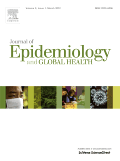
Journal of Epidemiology and Global Health
Unlocking the potential of open-access research for a healthier world.The Journal of Epidemiology and Global Health (ISSN: 2210-6006; E-ISSN: 2210-6014), published by SpringerNature, stands as a premier open-access platform in the field of epidemiology, dedicated to advancing our understanding of global health challenges since 2011. Based in Switzerland, this journal is recognized for its significant contributions to the discipline, achieving an impressive Q1 ranking in Epidemiology and positioning itself at the 88th percentile within the Scopus Medicine - Epidemiology category. With a goal to disseminate innovative research and foster dialogue among scholars, public health professionals, and students, the journal provides a rich repository of empirical studies, reviews, and theoretical contributions that address pressing epidemiological issues. Its commitment to open access ensures that vital research is freely available to the global community, thereby amplifying its impact and relevance. Researchers seeking to publish and access high-quality, peer-reviewed articles will find the Journal of Epidemiology and Global Health an invaluable resource in navigating the ever-evolving landscape of public health.

Andes Pediatrica
Transforming pediatric care with open-access insights.Andes Pediatrica is an esteemed open-access journal published by the SOC CHILENA PEDIATRIA that has been at the forefront of pediatric research since its inception in 2021. Based in Chile, the journal aims to enhance knowledge and dissemination of innovative findings in the fields of pediatrics, perinatology, and child health, making significant contributions to the wellbeing of young populations. With a commitment to open access, it facilitates widespread availability of research, ensuring that crucial information reaches clinicians, researchers, and policymakers globally. Despite its recent launch, Andes Pediatrica has already secured a respectable position within the academic community, reflecting its rank in the Q3 category for 2023 in Pediatrics as per Scopus rankings. By fostering a collaborative environment for sharing cutting-edge research, the journal plays a vital role in addressing contemporary challenges in child health, ultimately striving to improve health outcomes for children both in Chile and beyond.
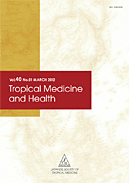
Tropical Medicine and Health
Connecting researchers to combat tropical diseases effectively.Tropical Medicine and Health is a prestigious open-access journal published by BMC that serves as a vital platform for researchers and health professionals focusing on the fields of tropical medicine, infectious diseases, and public health. With an ISSN of 1348-8945 and an E-ISSN of 1349-4147, the journal has established itself in the academic community since its inception in 2004, bridging the gap between research and real-world applications in managing tropical diseases. Recognized for its quality, it holds a commendable Q2 ranking in both the Infectious Diseases and Public Health, Environmental and Occupational Health categories, positioned in the 2023 Scopus rankings within the 85th and 74th percentiles, respectively. Researchers can access high-quality, peer-reviewed articles that contribute significantly to advancing knowledge in the field. With a commitment to fostering open scientific dialogue, Tropical Medicine and Health is not just a journal, but a collaborative space for researchers, students, and practitioners working to improve health outcomes in tropical regions worldwide.

Lancet Regional Health - Southeast Asia
Fostering Collaboration for Healthier CommunitiesLancet Regional Health - Southeast Asia, published by ELSEVIER, stands as a pivotal open-access journal established in 2022, dedicated to advancing regional health discourse across Southeast Asia. With its ISSN 2772-3682, this journal endeavors to provide a platform for high-quality research and innovative solutions in key areas such as Infectious Diseases, Psychiatry and Mental Health, and Public Health, Environmental and Occupational Health. Recognized for its exceptional quality, it has achieved Q1 rankings in these pressing categories, reflecting its commitment to publishing impactful findings that resonate with both the academic community and practitioners alike. The journal is vowed to fostering open access, enhancing the reach and applicability of its content to aid policy-making and community health advancements in the region. By facilitating access to groundbreaking research, Lancet Regional Health - Southeast Asia plays an essential role in shaping public health narratives and promoting collaboration among researchers, students, and healthcare professionals.

IJID Regions
Illuminating contemporary health challenges with innovative research.IJID Regions is a pioneering open access journal published by Elsevier, focusing on the critical fields of epidemiology, infectious diseases, and public health. Established in 2021, the journal aims to provide a platform for disseminating high-quality, innovative research that addresses pressing health issues and informs evidence-based practices in communities around the globe. With its impact factors reflecting a Tier Q2 and Q3 ranking in various medical subcategories on the Scopus platform, IJID Regions is positioned as a valuable resource for researchers, health professionals, and policy-makers striving to enhance public health outcomes. This journal not only champions open access since its inception, promoting the free flow of information, but also welcomes contributions that shed light on contemporary challenges in environmental and occupational health. Its commitment to fostering dialogue and collaboration in the health sciences is paramount, making it an essential read for those engaged in advancing public health knowledge and initiatives.